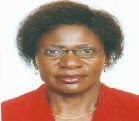But Pushes for Amicable Solution
 The Malawi Human Rights Commission, (MHRC),
takes a neutral position in the ongoing industrial actions and strikes by
employees of public sector organisations.
The Malawi Human Rights Commission, (MHRC),
takes a neutral position in the ongoing industrial actions and strikes by
employees of public sector organisations.
In a statement signed by its chairperson Ambassador
Sophie Asimenye Kalinde has however noted that some
strikes are outside
of the context of any negotiations, and their legality is questionable.
The Commission notes with
concern the grave consequences the continued industrial actions and strikes
have on the delivery of public services, which in turn pose serious negative
implications on the enjoyment of human rights.
“While noting that taking part in an
industrial action or a strike is a human right and that under section 33(4) of
the Constitution, the state is under an obligation to take measures to ensure
the right to withdraw labour, and whilst appreciating the validity of some of
the issues leading to the strikes, the Commission is emphasising that this
right like all human rights must be exercised with due regard to attendant
responsibilities, as well as, through actions that are within the parameters of
the applicable laws and in compliance with set legal procedures.” Reads the
statement
 |
Kalinde: Government should
at all times be forthcoming
and proactive in addressing
reasonable concerns of
employees
|
“The Commission would like to remind all stakeholders that the
right to fair labour practices including the right to withdraw labour, like
most rights, can only be exercised within the set legal parameters and with due
compliance with set procedures. This includes the need to exhaust all other
means of negotiation and compliance with the 7 days’ notice period prior to the
industrial action.”
The Commission therefore urged all public sector employees to
exercise the right to fair labour practices, including ensuring that essential
services are not disrupted. It particularly said employees
engaged in essential services provision such as the hospital sector "should at
all costs" avoid industrial actions which may be tantamount to endangering life
and the health of people.
“Equally, Government should at all times be forthcoming and
proactive in addressing reasonable concerns of employees engaged in provision
of essential services so as to pre-empt the need for strikes in this sector” urged the Commission
In its recommendations MHRC has among
others called upon Government and employees
on strike to address the differences that have led to the ongoing industrial
actions or anticipated strikes as a matter of urgency and in good faith while
making lawful and reasonable demands as conditions precedent for settlement of
labour-related disputes.
The commission has asked Government to take prompt and deliberate measures to address the
reasonable concerns of employees working in public essential service delivery,
so as to ensure that the limitation of their right to withdraw labour does not
result into negating the essence of the right to fair labour
practices.
The statement also, calls upon all concerned employees proceeding
on industrial actions that are outside of the provisions of the law, to call
off their strike and urged Employees to carefully consider other options for
resolving labour disputes.
Public institutions that received little salary adjustment effective
October 2014 compared to other public institutions among them workers from
Judiciary, anti-Corruption Bureau (ACB) and University of Malawi workers are
continuing with strikes against decision which government says it is salary harmonization
process.
However MHRC on the salary says the process has been characterised
with a number of shortcomings, including, different treatment of employees in
the sector and lack of clear justification for such decision to concerned
workers.
The commission adds that amidst developments of the adjustment of
salaries with huge percentages for the State President and Vice President,
Cabinet Ministers and Members of Parliament, increments made to other institution
ranging from 5% to 10%, are translating into negligible salary increases considering
prevailing cost of living and are viewed as a mockery.






